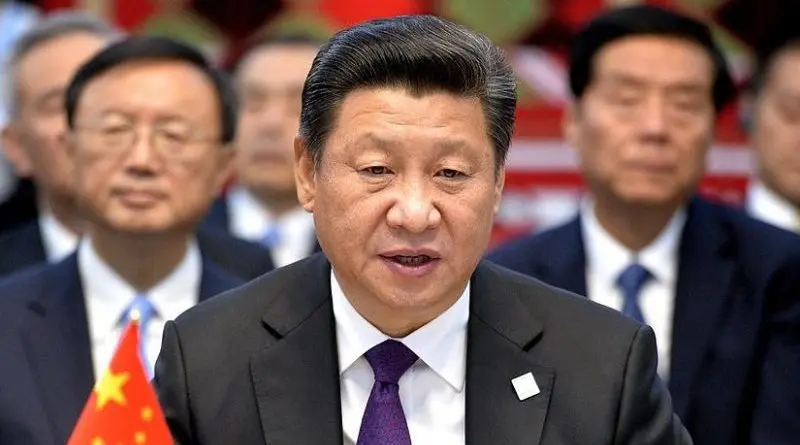Xi As ‘Core Leader’: Re-Emergence Of Strongman Politics? – Analysis
By IPCS
By Tapan Bharadwaj*
The sixth plenary session of the 18th Communist Party of China (CPC) Central Committee was held in Beijing on 24-27 October 2016. Plenary sessions are important in understanding the opaque political functioning of the Chinese government. The Central Committee decided to officially recognize President Xi Jingping as the “core leader”. With this Xi joins the league of leaders such as Deng Xiaoping, who had coined the word ‘core leader’. Deng called Mao Zedong and himself core leaders of their generations, and Jiang Zemin of the third generation of the CPC leadership. However, Hu Jintao, Jiang’s successor, was never given this recognition.
Deng Xiaoping’s retirement from politics had brought an end to the era of strongman politics, centred around one man. For the past two decades, collective leadership of political bureau members of the Central Committee is the governing principal of the CPC. The convention of general secretary of CPC as first among equals in the political bureau emerged with Jiang Zemin’s succession to power. Will Xi’s recognition as core leader change or challenge this convention? This question needs to be assessed within the broader context of Xi’s presidency over the past three years and four documents issued by CPC.
This article will highlight the important aspects of four documents issued after the plenary session, which includes the party communiqué. It will look at the importance of Xi becoming ‘Core leader’ and address the question whether collective leadership will remain the guiding principle for governance within the party?
Disciplining the party
The Political Bureau of the CPC Central Committee announced the agenda on 27 September itself, a month before the actual gathering.
The plenary session passed two related documents on the subject of discipline in the party. The first document titled “Some Norms Regarding Intra-party Political Life under New Circumstances” asks party members to act according to the CPC’s basic line by safeguarding the authority of the Central Committee and maintaining close ties with the people. The second document “Regulations Regarding Intra-party Supervision” asks to uphold the CPC’s leadership, strengthen party building, promote the comprehensive and strict governance of the party, and maintain the party’s status and purity. Both documents stress upon strict governance and centrality of the Central Committee in the CPC’s decision making. The objectives are to prevent old problems like corruption from recurring and new ones like income and regional inequality from spreading. The strict party governance will increase the CPC’s capability to solve its internal problems and defuse the challenges of party governance at various levels.
The third document issued was Xi’s interpretation of the first two documents. Xi said that the documents were introduced to supplement the layout of the CPC’s four comprehensives, a strategy to promote reform and opening up, refine the socialist modernization drive, as well as to adhere to and develop socialism with Chinese characteristics. The four comprehensives stand for all-round moderately prosperous society, deepening of reform, advancement of the rule of law and strict governing of the CPC. According to Xi, the sixth session addresses the fourth comprehensive while the remaining three have already been addressed by the third, fourth and fifth plenary sessions.
Revisiting the idea of collective leadership in the present context
The major transition in leadership and governance has been witnessed in the past two decades with the emergence of the collective leadership principle. The 2007 Party congress communiqué defines collective leadership as “a system with a division of responsibilities among individual leaders in an effort to prevent arbitrary decision making by a single top leader.” The aim was to ensure that no individual dominated the party leadership.
Today, Xi is the most powerful leader in the party. His tough national anti-corruption campaign has achieved significant success. The CPC’s Central Commission for Discipline Inspection, the nodal agency on anti-corruption, has stated that 1.01 million officials have been investigated for corruption since Xi took charges.
It has created an opposition of unknown nature within the party, where party loyalists are difficult to identify. Five out of seven Politburo members of the standing committee are retiring next year. A strong leader is needed to restore the collective leadership system in the party. Hence, CPC’s decision to recognize Xi as the core leader is a calculated move to avoid the emergence of any crisis in the party. This will help in continuing the policies without delay and disturbances. Xi’s national anti-corruption campaign, which has delivered its promise to target tigers and flies equally has had significant outcomes. 34 ministerial-level officials have reportedly been sentenced under this campaign, which will strengthen further in the future.
It is wrong to expect that Xi will become a figure like Mao only by being elevated to the title of “core leader”. He has been central to the party since he took charge. Both the Communiqué and Xi highlighted the importance of collective leadership system as the core. Xi by the virtue of his personality has managed to become, what his predecessor failed to achieve, the core in the Politburo. This will maintain the system of the political bureau’s leadership under a strong leader without undermining the collective leadership principle.
* Tapan Bharadwaj
Researcher, Institute of Peace and Conflict Studies
Email: [email protected]

